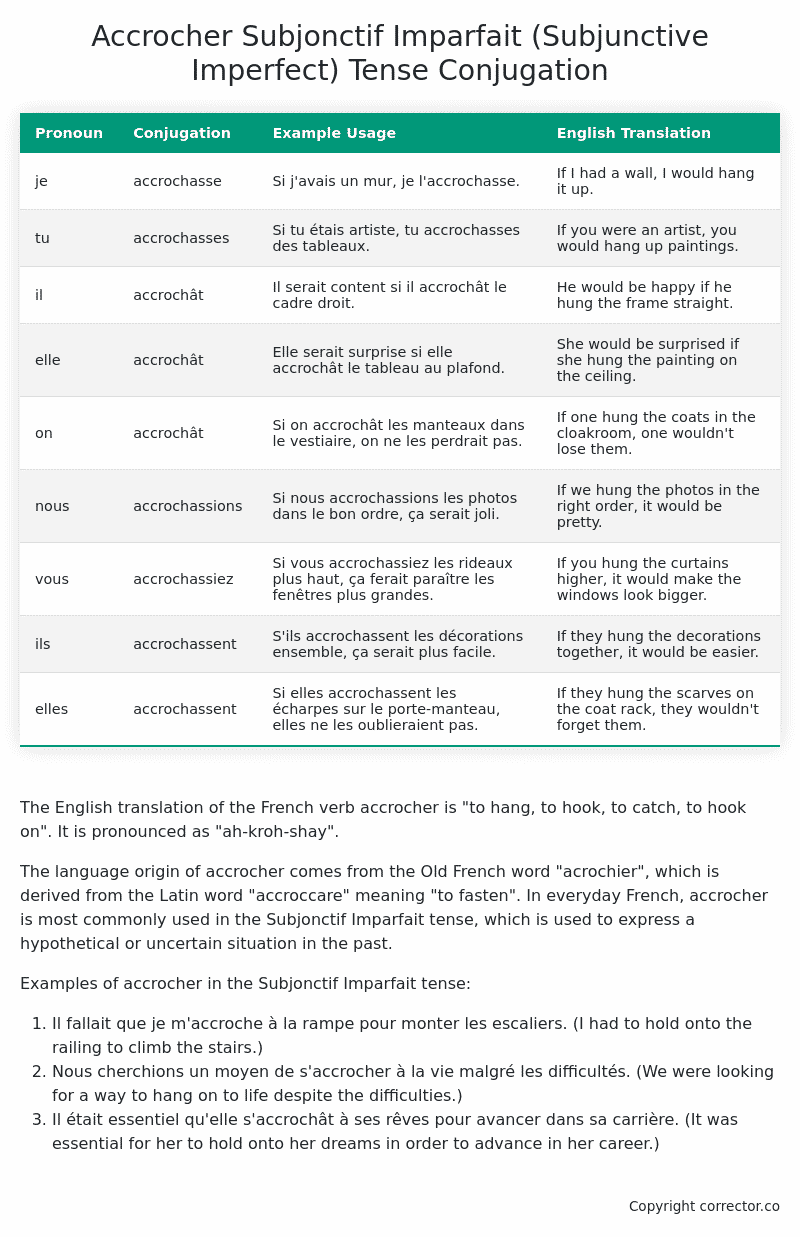Subjonctif Imparfait (Subjunctive Imperfect) Tense Conjugation of the French Verb accrocher
Introduction to the verb accrocher
The English translation of the French verb accrocher is “to hang, to hook, to catch, to hook on”. It is pronounced as “ah-kroh-shay”.
The language origin of accrocher comes from the Old French word “acrochier”, which is derived from the Latin word “accroccare” meaning “to fasten”. In everyday French, accrocher is most commonly used in the Subjonctif Imparfait tense, which is used to express a hypothetical or uncertain situation in the past.
Examples of accrocher in the Subjonctif Imparfait tense:
- Il fallait que je m’accroche à la rampe pour monter les escaliers. (I had to hold onto the railing to climb the stairs.)
- Nous cherchions un moyen de s’accrocher à la vie malgré les difficultés. (We were looking for a way to hang on to life despite the difficulties.)
- Il était essentiel qu’elle s’accrochât à ses rêves pour avancer dans sa carrière. (It was essential for her to hold onto her dreams in order to advance in her career.)
Table of the Subjonctif Imparfait (Subjunctive Imperfect) Tense Conjugation of accrocher
| Pronoun | Conjugation | Example Usage | English Translation |
|---|---|---|---|
| je | accrochasse | Si j’avais un mur, je l’accrochasse. | If I had a wall, I would hang it up. |
| tu | accrochasses | Si tu étais artiste, tu accrochasses des tableaux. | If you were an artist, you would hang up paintings. |
| il | accrochât | Il serait content si il accrochât le cadre droit. | He would be happy if he hung the frame straight. |
| elle | accrochât | Elle serait surprise si elle accrochât le tableau au plafond. | She would be surprised if she hung the painting on the ceiling. |
| on | accrochât | Si on accrochât les manteaux dans le vestiaire, on ne les perdrait pas. | If one hung the coats in the cloakroom, one wouldn’t lose them. |
| nous | accrochassions | Si nous accrochassions les photos dans le bon ordre, ça serait joli. | If we hung the photos in the right order, it would be pretty. |
| vous | accrochassiez | Si vous accrochassiez les rideaux plus haut, ça ferait paraître les fenêtres plus grandes. | If you hung the curtains higher, it would make the windows look bigger. |
| ils | accrochassent | S’ils accrochassent les décorations ensemble, ça serait plus facile. | If they hung the decorations together, it would be easier. |
| elles | accrochassent | Si elles accrochassent les écharpes sur le porte-manteau, elles ne les oublieraient pas. | If they hung the scarves on the coat rack, they wouldn’t forget them. |
Other Conjugations for Accrocher.
Le Present (Present Tense) Conjugation of the French Verb accrocher
Imparfait (Imperfect) Tense Conjugation of the French Verb accrocher
Passé Simple (Simple Past) Tense Conjugation of the French Verb accrocher
Passé Composé (Present Perfect) Tense Conjugation of the French Verb accrocher
Futur Simple (Simple Future) Tense Conjugation of the French Verb accrocher
Futur Proche (Near Future) Tense Conjugation of the French Verb accrocher
Plus-que-parfait (Pluperfect) Tense Conjugation of the French Verb accrocher
Passé Antérieur (Past Anterior) Tense Conjugation of the French Verb accrocher
Futur Antérieur (Future Anterior) Tense Conjugation of the French Verb accrocher
Subjonctif Présent (Subjunctive Present) Tense Conjugation of the French Verb accrocher
Subjonctif Passé (Subjunctive Past) Tense Conjugation of the French Verb accrocher
Subjonctif Imparfait (Subjunctive Imperfect) Tense Conjugation of the French Verb accrocher (this article)
Subjonctif Plus-que-parfait (Subjunctive Pluperfect) Tense Conjugation of the French Verb accrocher
Conditionnel Présent (Conditional Present) Tense Conjugation of the French Verb accrocher
Conditionnel Passé (Conditional Past) Tense Conjugation of the French Verb accrocher
L’impératif Présent (Imperative Present) Tense Conjugation of the French Verb accrocher
L’infinitif Présent (Infinitive Present) Tense Conjugation of the French Verb accrocher
Struggling with French verbs or the language in general? Why not use our free French Grammar Checker – no registration required!
Get a FREE Download Study Sheet of this Conjugation 🔥
Simply right click the image below, click “save image” and get your free reference for the accrocher Subjonctif Imparfait tense conjugation!

Accrocher – About the French Subjonctif Imparfait (Subjunctive Imperfect) Tense
Formation
Common Everyday Usage Patterns
Interactions with Other Tenses
Subjonctif Présent
Indicatif Passé Composé
Conditional
Conditional Perfect
Summary
I hope you enjoyed this article on the verb accrocher. Still in a learning mood? Check out another TOTALLY random French verb conjugation!


